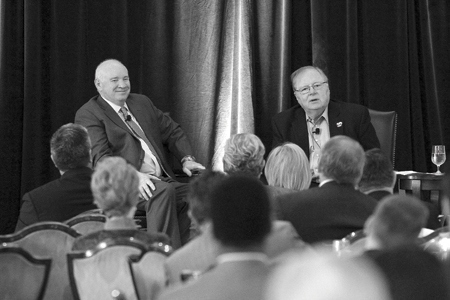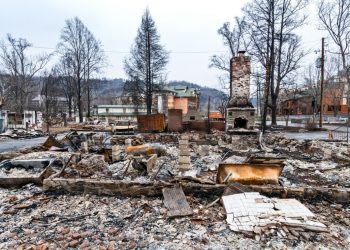 When it comes to real estate icon Dave Liniger, John Featherston says it best: “He is the Dos Equis commercial. This is the most interesting man in the world.”
When it comes to real estate icon Dave Liniger, John Featherston says it best: “He is the Dos Equis commercial. This is the most interesting man in the world.”
This is how Featherston, RISMedia president and CEO, fittingly introduced the RE/MAX chairman and co-founder during a special session at RISMedia’s Real Estate CEO Exchange, “The Franchise Perspective: One-on-One with Dave Liniger.”
From being one of the first real estate brokers to employ a predominantly female workforce to nearly waging a run for the Senate, Liniger’s adventurous spirit and storied career have provided him with an array of valuable insights and staunch opinions to impart. During RISMedia’s Real Estate CEO Exchange, held at Manhattan’s Yale Club on Sept. 9 and 10 (see full recap on page 62), Featherston sat down with Liniger for a candid interview about the past, present and future of the real estate business, for which Liniger received a standing ovation from the 200 brokers and industry leaders in attendance. Following are excerpts from their memorable conversation:
John Featherston: Dave, first of all, what do you see for the remainder of 2014 and looking ahead to 2015?
Dave Liniger: The recovery has not really happened as rapidly as any of us would have expected. Statistically, there is business out there, but you have to be more competitive, better and smarter than the competition to get it—it’s up to the individual agent to figure out how to make it in the current market. Next year, there should be about 5.3 million home sales, and the year after that, the market should get significantly better. I see a significant increase around the middle of 2015 into 2016 and 2017.
JF: When the market was in the doldrums of the downturn, you took a leadership position in training agents to handle distressed property business. Now that this segment is winding down, what’s next?
DL: Most people in the industry do not understand how significant foreign purchases are today and how much more significant they will become. Houses are being purchased by non-American people from countries like South and Central America, where there is instability. The Chinese government is encouraging wealthy Chinese to buy real estate outside of the country because they are bidding prices up and creating a bubble there. This type of foreign investment is going to increase, and brokers and agents need to figure out how to tie into it.
JF: How are current government regulations impacting brokerage business, specifically, affiliated business arrangements?
DL: The pendulum swings back and forth, and this election cycle, we will see the pendulum swing back from the far left to the center when people get fed up and vote differently. The conservatives feel there’s far too much regulation and the liberals feel there’s not enough. But 80 percent of people are in the center and could probably get along fine without the nuts on either side.
I think the regulation front will loosen up in the future, but we have to be out there doing things about it.
JF: When Zillow and Trulia first came on the market, they were looked at as interlopers. But today, you’re doing a lot of business with Trulia. What’s your position now, especially in light of the merger?
DL: During RISMedia’s CEO Exchange at Sanctuary several years ago (Liniger’s private golf club outside of Denver), I looked at Zillow and says, “We have to figure out what your position is. Are you going to be in the media business or are you replacing real estate companies? If you’re going to be a media company, then you’re my partner.” They assured me that they don’t want part of our commissions—they want advertising revenues.
If Zillow and Trulia have cost efficiencies between the two companies, I don’t have a problem with the merger. I look at them as my partner. They spent $500 million on a technology platform—our company doesn’t have that kind of money, nor do any others. So they are providing a service to REALTORS®— a service that REALTORS® should’ve created in the first place.
JF: In your opinion, what are the most significant changes the real estate industry has seen?
DL: A lot of people ask, “What’s changed in the last five years?” But it’s more important to ask, “What hasn’t changed?”
What hasn’t changed is that this is still an agent-centric business where the agent still has the relationship with the buyer and seller. Brokers who can create the correct environment for agents are the ones who will succeed. Part of this environment is things, part of it is people, and part of it is technology and trainers. And the most important part is the leader. Do you coach, prepare and train? As our CEO Margaret Kelly says, you can’t give yourself personal attention and appreciation.
JF: Dave, what’s the next adventure for you?
DL: I’ve had a fabulous life of military service, friends, adventures…but starting a small business and succeeding at it is probably the greatest adventure in the world. That success will be with you until the day you die. Being in business for yourself is the greatest invention there is. I have a love affair with real estate agents—we earn every penny, no one hands it to us. We have to figure out how to make a living. The friendship and relationships of independent business people like yourself is the greatest adventure in the world.
For more information, visit www.remax.com.











